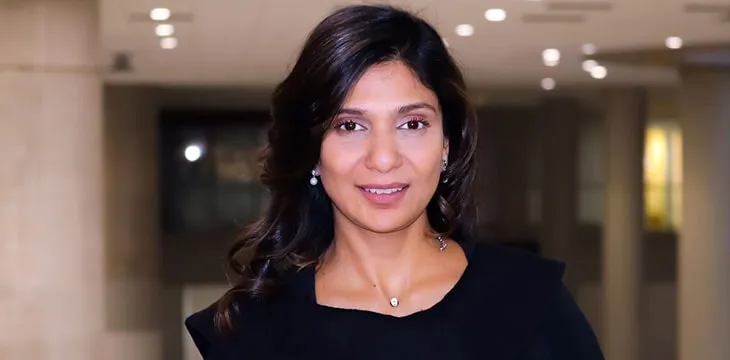|
Getting your Trinity Audio player ready...
|
I recently caught up with Delta Blockchain Fund and FINTECH.TV founder Kavita Gupta, who is also a visiting professor at Stanford University and a former executive at ConsenSys Ventures. We covered various topics, although related to one subject—blockchain and Bitcoin. Gupta spoke about her experience of 17 years in the financial technology space, current and future plans of Delta Blockchain, and more.
Gupta first heard of the term Bitcoin mining in 2013 while she was working at the World Bank in Cairo. That pulled her into mining, but “not very seriously.” However, the ICO craze of 2016 convinced her to quit her then full-time job at Eric Schmidt Foundation Fund, which led to the launch of Consensys in 2017.
In September 2021, Gupta founded the Delta Blockchain Fund, a strategic investment fund that closed after receiving about US$50 million in commitments from a wide array of investors, she told CoinGeek in a phone interview. The fund features an entity known as the Delta Growth Fund, primarily focusing on special purpose vehicles (SPVs). Gupta shared that she was probably the second woman founder and the only woman of color—Indian—in this space.
“There is no dearth of money in this space today. This industry has more money than it should have. That was not the case a decade ago. There was very little money and if you were even remotely involved in the crypto space, people warned ‘oh, you’d go to jail,’” she said.
Regulations, scams, and digital currencies
Can the digital currency industry regulate itself? When asked, Gupta pointed out a phrase: “Extremes of anything is bad.”
She expressed that self-regulation in any industry had not worked in the past, but over-regulating without even understanding the technology and its utility, would not work either. Citing an example of encryption, she noted encryption was once considered a complete taboo, but today no application exists without that feature.
She said India taxed the digital currencies without even legally acknowledging them as an asset.
“The Indian government is killing it by taxing it, leading to the biggest [multi-billion-dollar] brain drain ever within a span of two weeks in this industry. India should learn from countries like the U.K. as well as Spain, which have assigned a special status to crypto,” she noted.
When asked about how the industry can clamp down on the several scams happening on ETH, Gupta responded: “Several exploits happened in the last couple of months, including a recent scam where almost US$33 million worth of ETH got permanently locked. Whenever there is a technology boom, exploits happen, but the difference in this industry is that no one is trying to hide it and people openly talk about it. Exposing loopholes and scams on blockchain happen much faster than other technologies.”
She added that smart contract auditing and learning from previous scams is essential and that companies like Quantstamp and Halborn are a huge help in identifying loopholes and avoiding scams. “They conduct extensive evaluations and offer extra layers of security. The space will evolve as we are identifying where the hacks happen and why.”
Which blockchain will last?
“There are well over 10,000 coins in existence,” I said, stressing one of them—Bitcoin SV—and asking Gupta to share her thoughts on the same. She said her company [Delta Blockchain Fund] has not yet come across any BSV-based project. But, Gupta noted, she would be pleased and receptive to considering one.
“If you know of anyone, please send it our way,” she added with a smile.
Will only one of them last the longest or forever? “The world is already multichain, it is no longer a monopoly,” she said.
Gupta considers herself a huge believer in Ethereum but did not hesitate to say that besides Ethereum, other blockchains are being used because of lower gas fees compared to very high fees on Ethereum. She believes that companies will choose a combination of blockchains companies and will pick other blockchains depending on the sector they focus on.
“In the next three years, we will see a model of interoperable chains depending on different use cases companies will be implementing. The future is not going to be one chain because different blockchains offer different benefits and entrepreneurs need it all—security, productivity, throughput, and low cost.”
Bitcoin and blockchain education
Gupta teaches a course “Beyond Bitcoin” at Stanford University in California. Speaking of her teaching experience, she indicated that students had displayed a good amount of curiosity about blockchain technology in the last two years.
“They are showing interest in pursuing careers in this technology and schools like MIT and Harvard already offer dedicated courses in blockchain and Bitcoin. I won’t be surprised to see a Ph.D. in Blockchain in the next one year,” she said.
Her only advice to young bitcoin investors is that they should not follow “WhatsApp advice” and that they must do their own research.
“This technology is by young people and for young people, and the youth sees the world in a very different way. They are digital and they expect and like instant returns and quick profits. It is about the mode of payment, but mainly the inclusivity aspect of it, and digital currency offers that,” Gupta reminded.
Gupta feels that there is a shortage of women founders in this industry.
“It is changing, not as fast as I want it to, but it is happening. Delta Blockchain Fund has finally invested in a woman-owned company slated to be announced next week. Crypto still carries an image that it is about ‘crypto bros.’ Apart from investing, we have a research arm and we publish papers related to extensive analysis of several blockchains in addition to other relevant topics,” she revealed.
Watch: CoinGeek New York presentation, Increasing Footprints of BSV Blockchain in Middle East & South Asia

 07-05-2025
07-05-2025 





